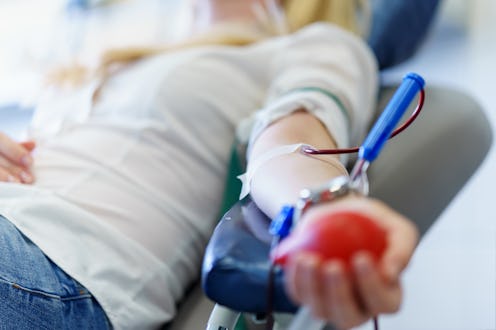Life
A New Universal Blood Type Might Soon Become A Reality
Scientists may be one step closer to creating a new “universal” blood type after discovering a new way to use certain bacteria found in our gut. This new research could help counteract emergency blood shortages and, ultimately, save lives.
Let’s start with the basics on blood donation and blood types. There are four different blood types: A, B, AB, and O. Due to a unique type of sugar antigen found on their surface, those with type A blood can only donate to individuals who also have type A or type AB blood. The same is true of those with type B blood: They can only donate to those with type B or type AB. Type O blood, however, is known as the universal donor because it doesn’t contain those surface sugars. While people with type O blood can only receive blood from people who also have type O blood, all blood types can receive donations of Type O blood, putting it in high demand. That’s why this latest discovery is so exciting.
Researchers have found a way to repurpose an enzyme made by bacteria in our guts that breaks down antigens like the sugars found in certain blood types. “We have been particularly interested in enzymes that allow us to remove the A or B antigens from red blood cells," Stephen Withers, Ph.D. and study lead author, says. “If you can remove those antigens, which are just simple sugars, then you can convert A or B to O blood.”
Essentially, this enzyme could potentially turn any blood type into a universal blood type.
Scientists have been trying to create a lab-made universal blood type for a while now. However, they had yet to find an enzyme that was safe, efficient, and reliable enough to use. Withers and his study co-authors hope this new enzyme is a better candidate for the job. According to Withers, this new enzyme created by gut bacteria is “30 times more effective” than the best-performing previous enzyme.
Another major hurdle is cost. This has been a problem for previous solutions, like one the came from a study in 2000 focused on specifically converting type B blood to a universal type. This solution, which also utilized a blood-altering enzyme, was deemed “too expensive and inefficient” for it to have real-world application.
Dr. Alyssa Ziman, the director of transfusion medicine at UCLA Health, told LiveScience she is particularly concerned about the economic implications of this new gut bacteria enzyme. “It just becomes another step and another cost,” Ziman said, specifically referring to the fact that this enzyme could only be used on one donation at a time. To minimize the risk of spreading infectious disease, blood center never pool together blood donations. So, rather than combining all Type A blood donations and utilizing this enzyme, scientists would have to change blood donations one by one.
A better solution to blood shortages, Ziman tells LiveScience, would just be getting more people to donate. Unfortunately, not everyone is eligible for blood donation. This is in part due to medical restrictions (i.e. anemia). However, many have been critical over the waiting period required for gay men to donate blood.
As the Red Cross’s website states, a man who has sex with men must “defer for 12 months from the most recent sexual contact” in order to be eligible to donate blood. Meaning, gay men must abstain from sex for a year in order to donate blood. Prior to 2015, the FDA banned gay men from donating blood altogether. This was instituted in the '80s during the height of the HIV/AIDS epidemic and only lifted three years ago. As one person told the Kansas City Star, “It’s a Band-Aid to fix a bigger problem.”
With this latest enzyme hoping to make blood donations more universal, hopefully we’ll get closer to making donating blood more accessible to everyone.
